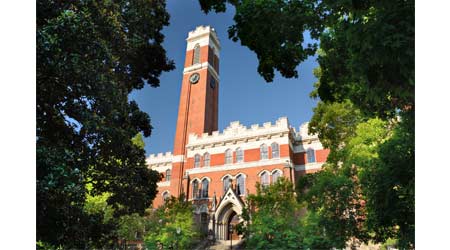Five Minutes With Audio & Video Home
fiveminuteswith
Vanderbilt University Transitions Away from Coal to Natural Gas to Heat Campus Facilities

Mitch Lampley, the director of engineering and technical support-plant operations at Vanderbilt University in Nashville, Tenn., discusses the university's transition away from using coal to generate heat for campus facilities.
Before decommissioning of the plant's last coal boiler, the university's power plant relied on burning coal for 126 years. The power plant has partially used natural gas since 1988, but still burned 105 million pounds of coal and produced 15 million pounds of waste per year.

Mitch Lampley
director of engineering and technical support-plant operations
Vanderbilt University in Nashville, Tenn
1. Explain the reasons behind the university's decision to move away from coal.
We want to be environmentally responsible and move away from coal. The project reduces emissions, improves plant efficiency through modernization of controls, and reduces greenhouse gases.
2. What was your role in specifying new equipment for the conversion to the dual-fuel boilers?
We hired an engineering firm that helped us design the new plant and specify what equipment we needed (dual fueled package boilers for redundancy) and what equipment would fit into our existing plant.
3. Describe your role in the budgeting and planning processes for the project.
With the help of the engineering firm, we developed a budget for the entire project. This budget included not only new large pieces of equipment but also demolition of old equipment and installation of redundant support equipment. The preliminary schedule was developed and both the schedule and budget were presented to the board of trust members for approval. After approval, a construction manager was hired and the design and schedule was fully developed
4. What role is your department playing in the conversion process?
Vanderbilt is running this conversion project through the campus planning organization as a campus project. We are playing the role of customer and technical advisors to the project.
5. What phase of the transition is your department focusing on right now?
We are focusing on the acceptance testing of the new package boilers and ensuring reliable steam production from these new pieces of equipment. The new gas turbine and heat recovery steam generator are also being installed at this time.
6. Have you encountered any surprises along the way?
New equipment does not always work on the first try. Even a package boiler has many suppliers and ancillary systems that have to work seamlessly with the boiler.
7. What kind of energy savings does the university hope to realize because of the conversion?
At current fuel pricing we are expecting about $3 million in annual utility savings. We are also expecting to save an estimated $11 million worth of plant maintenance that would have been required over the next five years due to the new more efficient equipment.
posted: 2/27/2015









